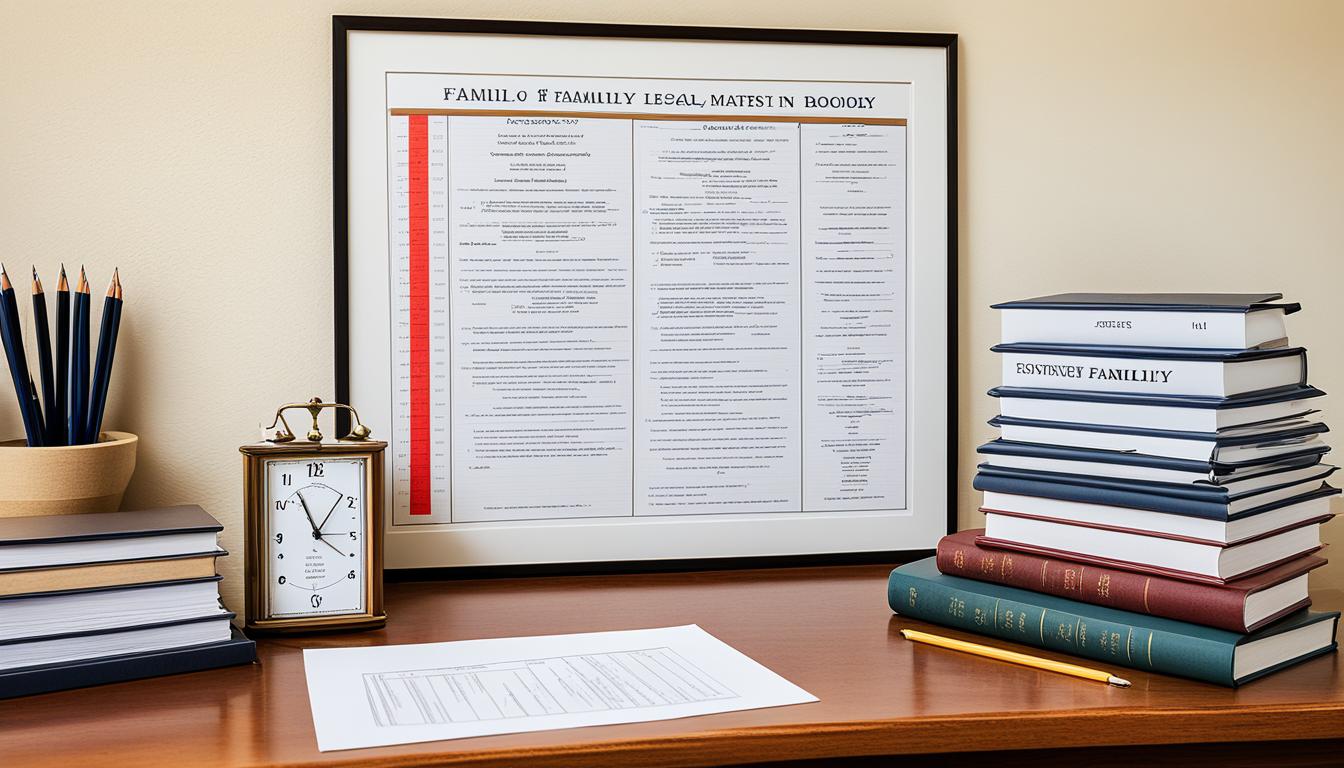Law & Insurance
Navigating Family Law with Precision: Elite Legal Support for Complex Issues!
Navigating family law can be a complex and overwhelming process, especially when dealing with high-conflict custody cases and other challenging family issues. However, with the right legal support, you can navigate these complexities with precision and ensure that your rights and the best interests of your family are safeguarded.
In this article, I will explore various aspects of family law, providing insights, strategies, and guidance for tackling complex issues such as custody disputes, stress management, conflict de-escalation, and securing the right legal representation. I will also discuss the importance of precision in documentation, consistency in visitation schedules, and understanding key conflicts in high-conflict custody cases. Additionally, I will provide an overview of divorce proceedings in Texas, including the grounds for divorce and the spotlight on conservatorship and visitation rights.
Lastly, I will emphasize the importance of building trust through transparency and diligence in the legal process and aligning with an elite legal support framework. With the information and strategies shared in this article, you can approach family law matters with confidence and make informed decisions for a positive outcome for you and your family.
Key Takeaways:
- Legal support is crucial in navigating complex family law issues.
- Precision in documentation and consistency are vital for a successful case.
- Stress management strategies can help alleviate tensions in child custody disputes.
- De-escalating conflicts and focusing on the children’s needs are essential in high-conflict custody cases.
- Identifying and understanding key conflicts can contribute to resolving disputes effectively.
The Essentials of High-Conflict Custody Cases
High-conflict custody cases can be emotionally draining and legally challenging. In this section, I will delve into the essentials of handling high-conflict custody cases, providing valuable insights and strategies to navigate the complexities of these situations.
Understanding the Legal Battlefield
When dealing with high-conflict custody cases, it is crucial to have a clear understanding of the legal system and process. Familiarize yourself with the laws and regulations specific to your jurisdiction, as they can significantly impact the outcome of your case. Knowing the legal battlefield will empower you to make informed decisions and effectively advocate for your rights and the best interests of your child.
“Having a thorough understanding of the legal battlefield is the first step towards success in high-conflict custody cases.”
Strategic Communication Tactics
Strategic communication is key to navigating high-conflict custody cases. Adopting effective communication tactics can help you de-escalate tensions, maintain composure during accusations, and keep the focus on the well-being of your children. It is essential to choose your words carefully, be respectful, and prioritize open and honest dialogue. By employing strategic communication tactics, you can effectively navigate the complexities of these cases and promote productive co-parenting relationships.
Importance of a Consistent Visitation Schedule
A consistent visitation schedule is paramount in high-conflict custody cases. Establishing and adhering to a consistent visitation schedule provides stability and predictability for the child and promotes a healthy co-parenting relationship. Consistency in visitation ensures that both parents have quality time with their child and contributes to the well-being and emotional development of the child. It also reduces conflicts and provides a framework for successful co-parenting.
By understanding the essentials of high-conflict custody cases, including the legal battlefield, strategic communication tactics, and the importance of a consistent visitation schedule, you can navigate these challenging situations with confidence. Stay informed, seek professional guidance when necessary, and prioritize the well-being of your child above all else.
Legal Support for Family Issues: Precision in Documentation and Consistency

In the realm of family law, legal support plays a crucial role in resolving complex issues and protecting the rights of individuals and families. When facing family challenges, precision in documentation and consistency are key to building a strong case and ensuring favorable outcomes.
The process of documenting and organizing evidence requires meticulous attention to detail. It is essential to gather all relevant information and ensure its accuracy and authenticity. By following documentation best practices, you can present a compelling case that withstands scrutiny.
Consistency is equally important in family law matters. From court filings to financial records, maintaining consistency in documentation demonstrates your commitment and credibility. It helps present a cohesive narrative and strengthens your position when presenting your case in court.
By understanding the value of precise documentation and consistent record-keeping, you can enhance your chances of success in family legal proceedings. Legal professionals experienced in family law can provide invaluable guidance in this regard, helping you gather and organize evidence effectively while ensuring compliance with relevant legal requirements.
When seeking legal support for family issues, it is essential to work with professionals who understand the intricacies of family law and prioritize precision and consistency. By aligning with a legal support framework that emphasizes these qualities, you can navigate the complexities of family law with confidence and work towards achieving the best outcome for you and your family.
Stress Management Strategies for Navigating Child Custody Tensions
Navigating child custody tensions can be incredibly stressful. In this section, I will provide strategies for managing stress and maintaining emotional resilience during these challenging times. Implementing stress management strategies can help you stay grounded and focused on finding the best solutions for your child’s well-being.
Neutral Territory for Child Transfers
Establishing neutral territory for child transfers can greatly reduce tension and promote a smoother transition for the child. Choose a location that is neutral for both parents, such as a park or a community center, where both parties can feel comfortable. Avoid exchanges in places that may hold negative emotional significance for either parent, such as their respective homes. By selecting a neutral territory, you create a more neutral and safe environment for the child, minimizing potential conflicts.
Therapy as a Tool for Emotional Resilience
In addition to managing stress, seeking therapy can be a valuable tool for emotional resilience. Therapy provides a supportive space where both parents and children can express their emotions, process their experiences, and develop coping mechanisms. A licensed therapist specializing in family issues can help parents navigate the challenges of child custody tensions, providing valuable guidance and support.
Therapy for emotional resilience focuses on building emotional strength, enhancing communication skills, and fostering healthy coping mechanisms. By engaging in therapy sessions, parents can develop the emotional resilience needed to navigate child custody tensions and maintain their well-being as they prioritize their child’s needs.
Remember, seeking therapy is not a sign of weakness but a proactive step toward creating a healthier and more stable environment for your child. It can provide you with the necessary tools and support system to better manage the challenges and emotions that come with child custody tensions.
Next, we will explore de-escalating conflicts and the role parents play in maintaining composure and prioritizing their children’s needs.
De-escalating Conflicts: Your Role and Responsibilities
De-escalating conflicts is a critical aspect of handling high-conflict custody cases. As a parent navigating these challenging situations, it is important to understand your role and responsibilities in promoting a healthy co-parenting relationship. By maintaining composure during accusations and focusing on the needs of your children above all else, you can effectively navigate conflicts and protect their well-being.
Maintaining Composure During Accusations
Accusations and conflicts can create tense and emotional situations. It is crucial to maintain composure and avoid escalating the conflict further. Keep in mind that responding in an aggressive or defensive manner can damage your credibility and negatively impact the overall outcome of your case. Instead, consider the following strategies:
- Take a deep breath and remain calm before responding
- Listen actively to the accusations without interrupting
- Acknowledge the concerns raised and validate the emotions behind them
- Respond in a respectful and composed manner, focusing on the facts and avoiding personal attacks
- Seek clarity and understanding by asking questions or requesting evidence
By maintaining composure and responding thoughtfully, you can defuse tense situations and present yourself as a responsible and level-headed parent.
Focusing on Children’s Needs Above All
When conflicts arise, it is essential to prioritize the needs of your children throughout the custody process. By focusing on their well-being, you can make rational decisions and avoid getting caught up in personal grievances. Here are some key considerations:
- Engage in open and respectful communication with the other parent, keeping the child’s best interests in mind
- Be flexible and willing to compromise when it comes to visitation schedules and parenting arrangements
- Encourage positive co-parenting interactions and avoid involving children in adult conflicts
- Ensure that your actions, decisions, and communications reflect the child’s emotional, physical, and educational needs
- Work with a mediator or parenting coordinator if necessary to develop effective strategies for co-parenting
By prioritizing the needs of your children, you can create an environment that supports their well-being and minimizes the impact of conflicts on their lives.

Using these conflict resolution strategies, you can effectively de-escalate conflicts and promote a healthy co-parenting relationship. By maintaining composure, focusing on your children’s needs above all else, and prioritizing their well-being, you can navigate high-conflict custody cases with greater success.
Table
| Conflict Resolution Strategies | Benefits |
|---|---|
| Maintain composure during accusations | Preserves credibility and fosters productive communication |
| Focus on children’s needs above all | Encourages collaborative decision-making and minimizes the impact of conflicts on children |
| Practice active listening and empathy | Fosters understanding and promotes effective communication |
| Seek professional mediation if necessary | Provides a neutral forum for resolving conflicts and reaching agreements |
| Be flexible and willing to compromise | Creates an environment of cooperation and collaboration |
Identifying and Understanding Key Conflicts in High-Conflict Custody
High-conflict custody cases are often riddled with specific conflicts that demand careful consideration and resolution. In order to navigate these challenging situations, it is crucial to identify and understand the key conflicts that frequently arise. By gaining insight into these conflicts, you can develop strategies to address them effectively and promote healthier co-parenting dynamics.
When the Court Recommends Parenting Facilitators
Parenting facilitators play a significant role in high-conflict custody cases, as they are professionals recommended by the court to improve communication and decision-making between parents. These facilitators are trained to help parents overcome barriers, clarify misunderstandings, and establish productive co-parenting strategies. Their expertise can help alleviate tensions and create a more stable environment for the child.
The Role of Mediation in Settling Disputes
Mediation is an invaluable tool in the resolution of conflicts in high-conflict custody cases. It involves a neutral third party who assists both parents in finding common ground and reaching mutually beneficial agreements. Mediation can be particularly useful in addressing sensitive issues, such as visitation schedules, decision-making authority, and co-parenting responsibilities. By engaging in mediation, parents have the opportunity to work collaboratively towards resolutions that best serve the interests of their child.
Securing the Right Legal Ally in Family Law Battles
Finding the right legal ally is crucial when navigating complex family law battles. Having skilled and experienced legal representation can significantly impact the outcome of your case. A skilled divorce attorney can provide valuable guidance and expert assistance throughout the legal process, ensuring that your rights and the best interests of your family are protected.
Experience Matters: Choosing a Skilled Divorce Attorney
When choosing a divorce attorney, experience matters. Look for an attorney who specializes in family law and has a proven track record of success in handling similar cases. An experienced attorney will have a deep understanding of the complexities of family law and will be equipped to navigate the intricacies of your specific situation.
Furthermore, an experienced divorce attorney will have extensive knowledge of divorce laws and regulations, allowing them to provide you with accurate legal advice and effective strategies. They will be well-versed in negotiating settlements, advocating for your rights, and representing your interests in court if necessary.
Navigating Complex Legal Situations with Expert Assistance
Navigating complex legal situations can be overwhelming without expert assistance. A skilled divorce attorney will offer expert guidance, helping you understand the legal process and making informed decisions every step of the way.
They will assist you in gathering and organizing the necessary documentation, ensuring that all relevant information is presented accurately and effectively. Additionally, they will craft persuasive legal arguments, leveraging their expertise to protect your rights and achieve the best possible outcome.
During negotiations and mediation, an experienced attorney will provide strategic advice, advocating for your interests and working to secure favorable settlements. In court, they will present a compelling case, utilizing their knowledge of family law to argue on your behalf.
By securing the right legal ally who has the necessary skills and expertise, you can navigate complex legal situations with confidence, knowing that you have expert assistance guiding you every step of the way.

Unpacking Top Child Custody Issues in High-Conflict Cases
High-conflict custody cases can be complex and emotionally challenging. In this section, we will explore the top child custody issues that are commonly encountered in these cases. By understanding these issues, you can navigate the complexities of high-conflict custody cases with confidence and work towards the best outcome for your child.
Determining Primary Parental Responsibilities
One of the key issues in high-conflict custody cases is determining primary parental responsibilities. This involves deciding which parent will have the authority to make important decisions regarding the child’s upbringing, such as education, healthcare, and religious practices.
The court considers various factors when making this determination, including the child’s best interests, the capability of each parent to provide for the child’s needs, and the child’s relationship with each parent. It is important to present strong evidence and arguments to support your case and demonstrate your ability and willingness to act in the child’s best interests.
Planning for Your Child’s Education and Healthcare Decisions
Another important child custody issue in high-conflict cases is planning for your child’s education and healthcare decisions. This involves making decisions about the child’s school, extracurricular activities, medical treatments, and other aspects of their well-being.
In high-conflict cases, it is crucial to establish clear guidelines and agreements regarding education and healthcare decisions. This helps ensure that both parents are involved in these important aspects of the child’s life and promotes consistency and stability for the child. It is important to work towards finding common ground and seeking solutions that prioritize the child’s best interests.
By addressing these top child custody issues in high-conflict cases, you can focus on creating a stable and nurturing environment for your child. Seeking professional legal guidance and mediation can also be beneficial in resolving conflicts and reaching agreements that prioritize the child’s well-being.
From Filing to Final Verdict: The Journey Through Divorce Proceedings in Texas
Navigating divorce proceedings in Texas can be complex. In this section, I will take you through the journey from filing to the final verdict in divorce cases in Texas. We will explore the various grounds for divorce, including fault and no-fault options, and provide insights into the considerations involved in choosing the appropriate grounds for your case. Additionally, we will shine a spotlight on conservatorship and visitation rights, highlighting the legal aspects and factors considered in determining the custody and visitation arrangements for children in divorce cases.
The Various Grounds for Divorce: Fault vs No-Fault
When filing for divorce in Texas, it’s important to understand the different grounds for divorce and their implications. Texas recognizes both fault and no-fault grounds for divorce.
Fault grounds: These grounds for divorce require proof of misconduct by one spouse, such as adultery, cruelty, abandonment, or a felony conviction. Fault grounds can have a significant impact on property division and spousal support decisions.
No-fault grounds: Texas also recognizes no-fault grounds for divorce, where the marriage is considered to be irretrievably broken. Unlike fault grounds, no-fault grounds do not require evidence of misconduct and may lead to a more amicable dissolution process.
Conservatorship and Visitation Rights in the Spotlight
When it comes to divorce cases involving children, conservatorship and visitation rights play a crucial role in determining parental rights and responsibilities. Conservatorship refers to the legal rights and duties of a parent, including decisions related to the child’s upbringing and welfare.
In Texas, there are two types of conservatorship:
- Joint managing conservatorship: In this arrangement, both parents share the rights and duties of raising the child, although the specific allocation of responsibilities may vary.
- Sole managing conservatorship: In some cases, the court may grant one parent sole managing conservatorship, giving them the exclusive right to make decisions about the child’s upbringing.
Visitation rights, also known as possession and access, outline the schedule and arrangements for the non-custodial parent to spend time with their child. The court aims to establish a visitation schedule that serves the best interests of the child while considering factors such as the child’s age, preferences, and the ability of the parents to cooperate.
It’s crucial to understand the legal aspects surrounding conservatorship and visitation rights during divorce proceedings in Texas to ensure a fair and equitable resolution for all parties involved.

Conclusion
In conclusion, navigating family law requires precision, expertise, and support. To ensure a successful outcome for you and your family, it is crucial to build trust through transparency and diligence in the legal process.
Open and honest communication is key in establishing trust between you and your clients. By providing clear and accurate information, you can create a strong foundation for your legal relationship and foster a sense of trust and confidence.
Consistently providing high-quality legal support is another essential element in building trust. By demonstrating your expertise, knowledge, and dedication to your clients’ cases, you can instill trust and reassurance that their best interests are being prioritized.
Additionally, aligning with an elite legal support framework, such as an attorney recognized as an Elite Lawyer, can offer access to the best possible legal assistance for your family law matters. This elite status signifies a commitment to excellence and a superior level of expertise, ensuring that you receive the highest quality representation and support.
By following these principles and seeking the necessary legal support, you can navigate the complexities of family law with confidence and achieve the best outcome for you and your family.
FAQ
What is family law?
When should I seek legal support for family issues?
How can a divorce lawyer help me?
What does a child custody attorney do?
What does spousal support legal aid involve?
What services do family mediation professionals offer?
How can a parenting plan consultation benefit me?
When should I consult a domestic violence lawyer?
What expertise does an adoption lawyer provide?
How can a spousal support advocate assist me?
What is parental rights legal aid?
Source Links
- https://www.bryanfagan.com/blog/2023/april/managing-high-conflict-custody-cases-in-texas-a/
- https://www.bryanfagan.com/blog/2016/july/the-ultimate-divorce-and-family-law-cheat-sheet/
- https://www.elitelawyer.com/blog

